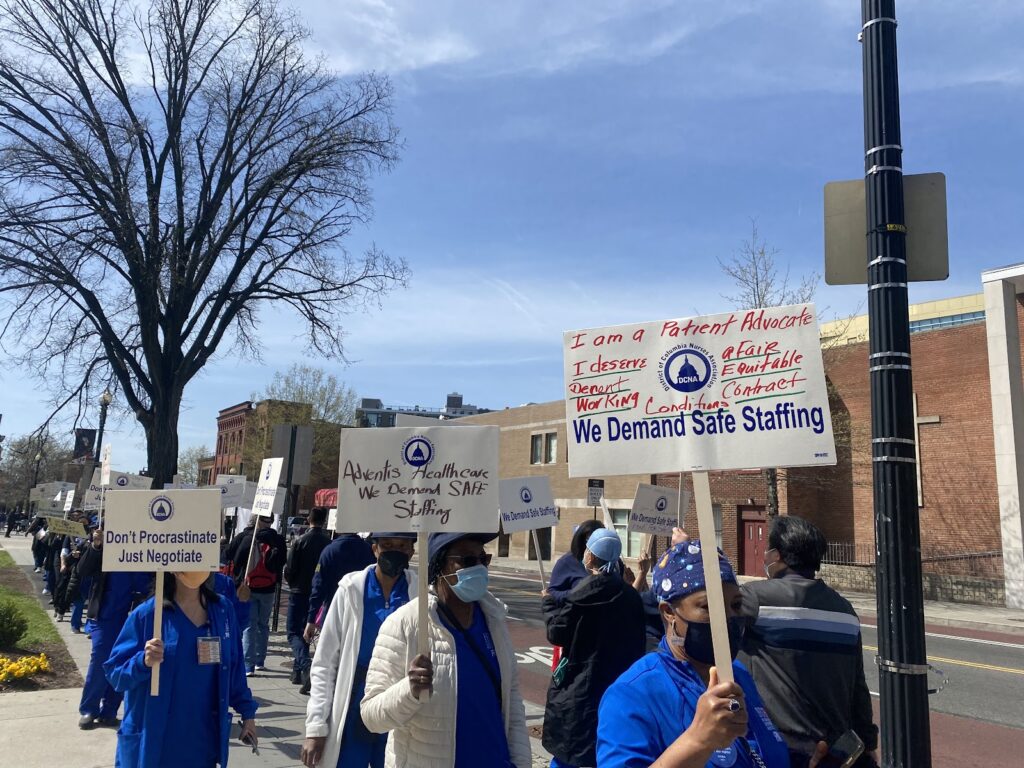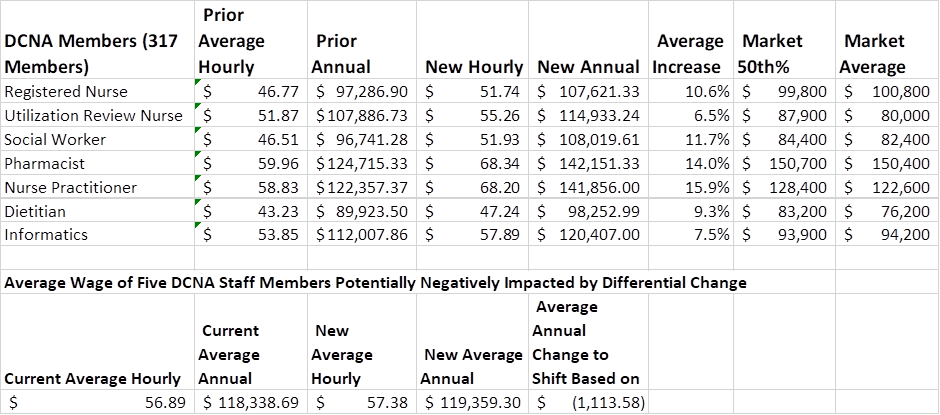
On Monday, April 11, Howard University Hospital (HUH) healthcare workers gathered outside of the hospital for a strike against Adventist HealthCare, the healthcare company currently managing HUH. The striking workers, represented by the District of Columbia Nursing Association (DCNA) labor union, are calling for contract negotiations, better staffing and improved working conditions, among other demands.
Dozens of healthcare workers in blue scrubs were seen in rows holding signs displaying their demands on the sidewalk outside of the hospital. The day-long strike commenced at 7 a.m., with public rallies at 11 a.m. and 5 p.m.
“We’re out here today because we haven’t been able to reach a contract with the employer. The employer has imposed contract terms that we could not agree to. Specifically, they refused to negotiate patient ratios with us, which are basically designed to make sure that a nurse is not assigned more than a reasonable amount of patients to care for so that they can provide adequate and safe care,” Edward Smith, the executive director of the DCNA, said.
Smith explained that the union represents about 320 Howard healthcare workers, including nurses, pharmacists, social workers and dietitians at the hospital, as well as nurses and some nurse practitioners at the student health center.
The strike came after months of deliberation between the DCNA and Adventist HealthCare, who failed to reach an agreement with the union healthcare workers pertaining to their contracts, which ended in November 2021.
Smith also spoke to the DCNA’s claim that differential pay for senior staff was being cut by HUH, as management has implemented a flat rate for all workers who work the differential pay shifts.
“They proposed and implemented cuts in nurses and healthcare workers’ differential pay. Differential pay is for weekend work and for weekday night work. You get a certain amount extra to work those shifts. Management changed the formula to do those which results in pay decreases for some of our senior employees for up to $4,000 to $5,000 a year…That’s one of the reasons we’re out here, but mostly because management isn’t giving us the respect we deserve,” he said.
In 2019, Adventist HealthCare and Howard University signed a three-year management services agreement, which officially began in February 2020. In addition to naming the new CEO of HUH, Anita L. A. Jenkins, one aspect of the agreement mentioned plans to build a new replacement hospital as part of the “overall strategy to continue serving the community and region.” Since taking over management at the hospital, some HUH nurses have expressed dissatisfaction with operations and working conditions.
Jane Anyu is a staff nurse on labor and delivery and has been working at HUH for over 10 years. She made claims of age discrimination practices pertaining to older nurses.
“They [Adventist HealthCare] are trying to bring in younger nurses with less experience. The smart thing to do would be to have experienced nurses working alongside the newer nurses, so they can teach them what they have learned over the years,” Anyu said.
Anyu, who has been a nurse for over 20 years, also spoke about her experiences dealing with understaffing at HUH.
“The staffing is a big issue. In November and December, we had just about three or four nurses in labor and delivery. A laboring patient is a potential C-section patient, so not having adequate nurses to take care of the patient is a patient safety issue that we’re very concerned about,” she said.
Tony Blue, director of public relations for HUH, addressed the accusations made by the DCNA members in a statement available on the hospital’s website. Blue addressed the impact of HUH’s implemented wage and shift differential on DCNA staff members.
The statement read, “The hospital has been working diligently to reach a new Collective Bargaining Agreement with DCNA, including participating in over 20 collective bargaining sessions and five mediation days. Despite our best efforts, we have been unable to reach an agreement. We have already implemented hourly wage increases averaging 9.6% based on our final proposal. Howard University Hospital is properly staffed and we have made proposals to the Union to work together to address future staffing needs. We respect and appreciate our RNs and all of our staff members at the hospital that deliver consistently excellent care for our patients.”
The statement also provided charts displaying the rate of pay of the DCNA nurses at HUH following Adventist HealthCare’s 9.8 percent wage increase.

Aaron Boe, sophomore political science major and chair of the Claudia Jones School for Political Education organization, was seen with his organization and other Howard students at the rally supporting the striking nurses. Members of the SEIU local 500, who had threatened to strike against the university in March, were also in attendance.
“When I heard there was going to be a strike here on campus by people who work for our university it just made sense to me that I would reach out to them and be like ‘what can I do to mobilize students to show up to this event?’ It’s really important that we unite as many progressive forces as possible,” Boe said.
Due to the failure to reach an agreement, the DCNA filed charges against HUH on April 4 to the National Labor Relations Board with allegations of refusal to furnish information, meaning that the employer has refused to bargain about wages and other conditions of employment.
Though the strike was only intended to last one day, Smith hoped that the demonstration would bring attention to the ongoing conflict between the DCNA and HUH in bargaining for contract negotiations.
Copy edited by: N’dia Webb









